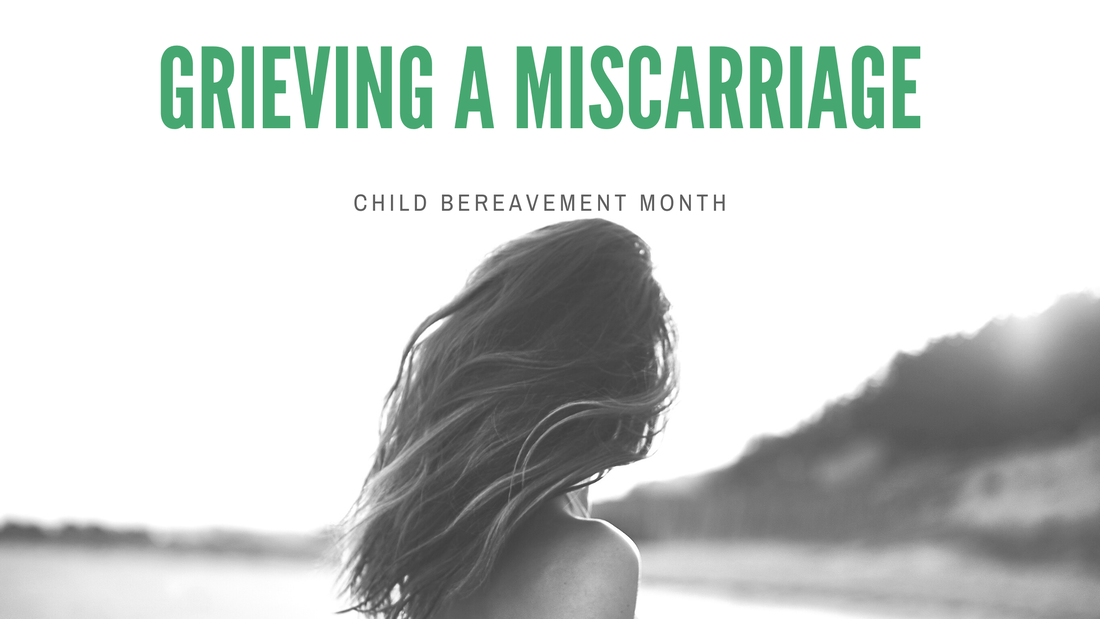|
Trigger Warning; this post discusses grief, miscarriage and stillbirth. Sometimes it's important to process these things by reading about them and sometimes that might not fit where you are emotionally. Honor yourself and take care.
July is Child Bereavement Month About 15-20% of confirmed pregnancies end in a miscarriage. This number is probably even higher as some pregnancies may be miscarried before the person even realizes they are pregnant. For some, a miscarriage is a blip on their journey towards having a baby. For others, a miscarriage is devastating and the grief unbearable. Whatever emotions you are feeling are ok; no one can tell you what to feel or how intense and long this will hurt. There are no "right" ways to grieve the loss of your pregnancy but here are some ideas that may help Find Support Some of us need to process things externally; we might need to talk with others about how we feel in order to sort through them. If this describes you, find your people. Most of us aren't very good at talking about grief and so some people may not respond the way you need them to. Find the people you can talk to though; this may need to be someone else who has gone through a miscarriage, a support group (Facebook has a few really great private groups for this), or even a therapist. It might also be helpful to find someone who doesn't pressure you to talk when you don't want to. Respect Your Feelings A lot of times friends, family members and even medical professionals will treat a miscarriage as no big deal; especially if it was early in the pregnancy others may expect that you weren't very attached yet and can just move on. If you feel like you can, great! And if you don't feel that way, that's ok too! In my experience as a therapist, a lot of people feel like they should get over things faster than they are. This may show up as your grief getting unexpectedly triggered by various events. Respect yourself and your needs. Expect Some Triggers One hard situation a lot of people face after a miscarriage is attending events like baby showers, meeting a friends new baby, or finding out someone else is pregnant. It's ok to have mixed feelings; you can be happy for a friend and want to support them while also reminded of your own loss. You may even find yourself needing to step back from these situations to respect your emotions. Sometimes talking about this with your friends can be helpful, sometimes not; trust your knowledge of yourself and your relationships. Most friends will be understanding if you need some space with these events that you are not "selfish" or "don't care" if you aren't ready. It's also ok if you these events don't increase your grief; it doesn't mean you don't love your baby if you don't feel triggered. If you get pregnant again or have a child after your miscarriage, this may also bring up grief and could be bittersweet; again none of these feelings are wrong or makes you a bad person or parent. It's Ok to Have Mixed Feelings About Getting Pregnant Again After a miscarriage, others may expect you to want to get pregnant again as soon as possible. And maybe this is something you want and feel ready for. For some people, this may bring up a lot of anxiety and it's normal to be fearful of having another miscarriage. It's also ok if you don't feel ready to start trying right away or even ever again. If you have a supportive partner, this can be a really great thing to talk about with them and find a good plan around sex and what next steps and timeline feels right for your family.
0 Comments
I attended an awesome training yesterday from Dr. Sayida Pepera with Diversity Uplifts all about transgenerational trauma and maternal health; this focused on the impact that slavery, racism and generations of violence have had on the mental health of the Black community, especially for Black mothers and Black pregnant folx.
One really important point that came up was giving ourselves and the people we work with permission to take care of ourselves especially when the news is triggering; and lately it's often triggering. Between the ongoing protests against police brutality after the murders of several Black men and women to ongoing fears about COVID-19 and the arrest of Ghislaine Maxwell, there is a lot that can bring up our past trauma right now. So what can you do when the news is triggering? Know Yourself None of these recommendations are one size fits all; you may be someone who needs to avoid the news completely during these times while another trauma survivor may become very involved and find talking about it healing and empowering. And that's ok! Know thyself! Become good at checking in with your emotions and your reactions to the news. Know what it looks like when you are triggered; do you shut down, do you become angry, do you start to get really on edge? It's also really helpful to know your own limits. This is easier said than done; a lot of us don't always notice when we are triggered so it may be helpful to enlist in the support of someone you trust, whether that be a friend, a partner or a therapist. Turn Off For some of us, we may need to avoid the trigger if possible. This may look like limiting how much news we are reading or watching (say only three articles a day or only 5 minutes at a time) or not consuming any at all. We may also need to change how engaged with social media we are as this is where a lot of us get our news. Whether it be "taking a break" from certain people or groups on your timeline or logging off for a bit altogether, moderating our Facebook, Instagram and Twitter usage can be a way to honor ourselves. Watch Out for Vicarious Trauma A lot of you involved with social justice work or working in a care-giving professions you may have heard of the idea that hearing about and witnessing others traumas can lead us to developing trauma symptoms. This is especially true if we have experienced trauma before. Our brains can't always tell when something is happening to us versus when something is happening to someone else. It's important for us to notice changes in our sleep, use of substances, avoiding things we usually love and if we are having more trouble getting upsetting thoughts outside of our mind. Practice Self-Care It's ok to take breaks! Even though there are very important things happening in our world right now, it's ok to step back and it's ok to do things that we enjoy and find comforting and relaxing even if they don't feel like "the most important things." Having hobbies, getting enough sleep, spending time with people we love is so important for us to grow in our own journeys while also being able to support others in theirs. |
ArchivesCategories
All
|


 RSS Feed
RSS Feed
